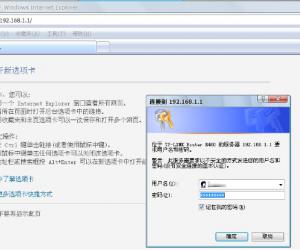帧中继(网云)的配置方法
发布时间:2015-06-17 12:08:45作者:知识屋
一、对几台路由器进行模块的添加,对pc机进行ip的配置。

同时对路由器进行模块的添加,我已习惯了了用模块0,常用的端口都是s0/0/0,同时我用的
是2811的路由器。 www.zhishiwu.com
其拓扑图为:
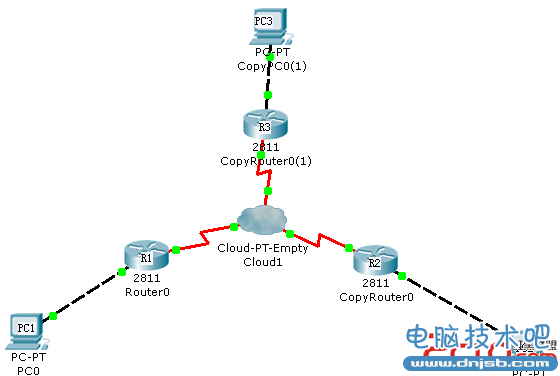
二、对几台路由器进行配置(基本的配置和帧中继的配置)
这里我就以R1为例,因为R2、R3是类似的。
ontinue with configuration dialog? [yes/no]: no
Router>en
Router#conf t
Router(config)#host R1
R1(config)#int s0/0/0
R1(config-if)#cl ra 64000
R1(config-if)#no shut
%LINK-5-CHANGED: Interface Serial0/0/0, changed state to up
R1(config-if)#encapsulation frame-relay
%LINEPROTO-5-UPDOWN: Line protocol on Interface Serial0/0/0, changed state to up
fra
R1(config-if)#frame-relay lmi-type cisco
R1(config-if)#int s0/0/0.1 point-to-point
%LINK-5-CHANGED: Interface Serial0/0/0.1, changed state to up
%LINEPROTO-5-UPDOWN: Line protocol on Interface Serial0/0/0.1, changed state to up
R1(config-subif)#ip add 192.168.1.1 255.255.255.0
R1(config-subif)#frame-relay interface-dlci 102
R1(config-subif)#ex
R1(config)#int s0/0/0.2 point-to-point
R1(config-subif)#ip add 192.168.2.1 255.255.255.0
R1(config-subif)#frame-relay interface-dlci 103
R1(config-subif)#ex
R1(config)#router rip
R1(config-router)#net 192.168.10.1
R1(config-router)#net 192.168.1.1
R1(config-router)#net 192.168.2.1
R1(config-router)#^Z
注意:R2、R3进行同样的配置,但是要注意的是其对应性:即R1的102和R2的201在同一个网段,R1的103和R3的301在同一个网段,R2的203和R3的302在同一个网段。之所以要配置rip协议,其目的是为了整个网络的连通性。当然其他的像ospf协议也可以。
Router>en
Router#conf t
Router(config)#host R1
R1(config)#int s0/0/0
R1(config-if)#cl ra 64000
R1(config-if)#no shut
%LINK-5-CHANGED: Interface Serial0/0/0, changed state to up
R1(config-if)#encapsulation frame-relay
%LINEPROTO-5-UPDOWN: Line protocol on Interface Serial0/0/0, changed state to up
fra
R1(config-if)#frame-relay lmi-type cisco
R1(config-if)#int s0/0/0.1 point-to-point
%LINK-5-CHANGED: Interface Serial0/0/0.1, changed state to up
%LINEPROTO-5-UPDOWN: Line protocol on Interface Serial0/0/0.1, changed state to up
R1(config-subif)#ip add 192.168.1.1 255.255.255.0
R1(config-subif)#frame-relay interface-dlci 102
R1(config-subif)#ex
R1(config)#int s0/0/0.2 point-to-point
R1(config-subif)#ip add 192.168.2.1 255.255.255.0
R1(config-subif)#frame-relay interface-dlci 103
R1(config-subif)#ex
R1(config)#router rip
R1(config-router)#net 192.168.10.1
R1(config-router)#net 192.168.1.1
R1(config-router)#net 192.168.2.1
R1(config-router)#^Z
注意:R2、R3进行同样的配置,但是要注意的是其对应性:即R1的102和R2的201在同一个网段,R1的103和R3的301在同一个网段,R2的203和R3的302在同一个网段。之所以要配置rip协议,其目的是为了整个网络的连通性。当然其他的像ospf协议也可以。
三、对中间的网继云进行配置
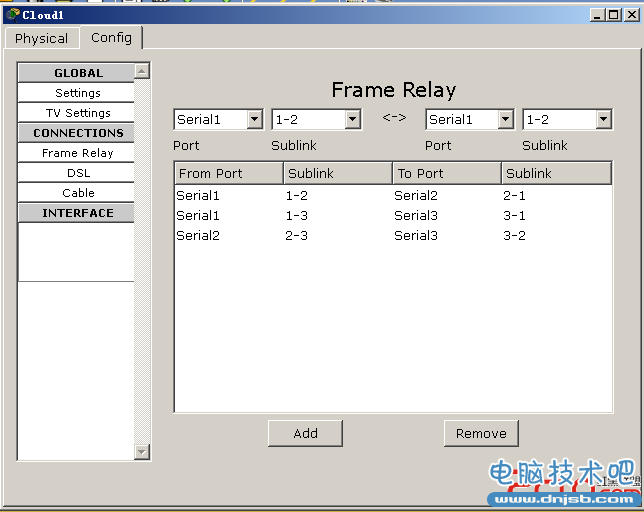
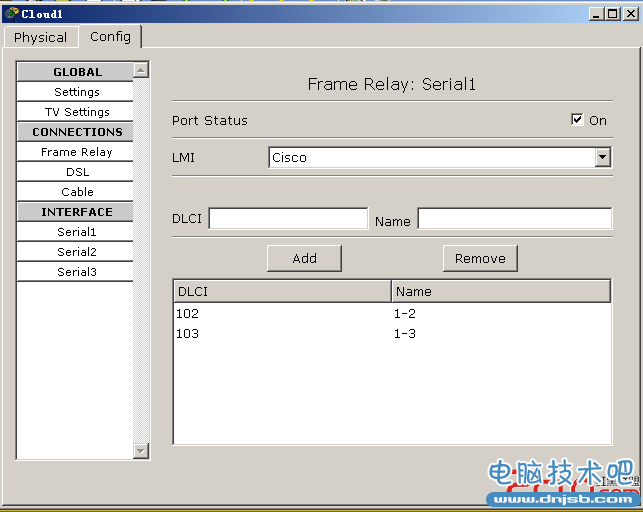
这里我们要注意那个对应性,即frame relay 模块的的对应性,换个说法就是要保证网络的畅通(有去有回)。
四、查看网络是否真的连通,即使用ping命令进行查看 www.zhishiwu.com
由此可见,网络的连通性是很好的,实验室成功的,网络是可以通信的,至于要追求更高的安全性什么的就得再使用其他的协议以及其他的设备。
R1#ping 192.168.3.2
Type escape sequence to abort.
Sending 5, 100-byte ICMP Echos to 192.168.3.2, timeout is 2 seconds:
!!!!!
Success rate is 100 percent (5/5), round-trip min/avg/max = 63/85/94 ms
R1#ping 192.168.3.1
Type escape sequence to abort.
Sending 5, 100-byte ICMP Echos to 192.168.3.1, timeout is 2 seconds:
!!!!!
Success rate is 100 percent (5/5), round-trip min/avg/max = 47/57/63 ms
R1#ping 192.168.2.1
Type escape sequence to abort.
Sending 5, 100-byte ICMP Echos to 192.168.2.1, timeout is 2 seconds:
!!!!!
Success rate is 100 percent (5/5), round-trip min/avg/max = 172/184/188 ms
R2#ping 192.168.1.1
Type escape sequence to abort.
Sending 5, 100-byte ICMP Echos to 192.168.1.1, timeout is 2 seconds:
!!!!!
Success rate is 100 percent (5/5), round-trip min/avg/max = 62/62/63 ms
R2#ping 192.168.10.10
Type escape sequence to abort.
Sending 5, 100-byte ICMP Echos to 192.168.10.10, timeout is 2 seconds:
!!!!!
Success rate is 100 percent (5/5), round-trip min/avg/max = 64/87/94 ms
R2#ping 192.168.10.1
Type escape sequence to abort.
Sending 5, 100-byte ICMP Echos to 192.168.10.1, timeout is 2 seconds:
!!!!!
Success rate is 100 percent (5/5), round-trip min/avg/max = 47/59/63 ms
R2#ping 192.168.20.1
Type escape sequence to abort.
Sending 5, 100-byte ICMP Echos to 192.168.20.1, timeout is 2 seconds:
!!!!!
Success rate is 100 percent (5/5), round-trip min/avg/max = 3/12/15 ms
R2#ping 192.168.30.10
Type escape sequence to abort.
Sending 5, 100-byte ICMP Echos to 192.168.30.10, timeout is 2 seconds:
!!!!!
Success rate is 100 percent (5/5), round-trip min/avg/max = 93/93/94 ms
R2#ping 192.168.3.2
Type escape sequence to abort.
Sending 5, 100-byte ICMP Echos to 192.168.3.2, timeout is 2 seconds:
!!!!!
Success rate is 100 percent (5/5), round-trip min/avg/max = 47/59/63 ms
R2#ping 192.168.1.2
Type escape sequence to abort.
Sending 5, 100-byte ICMP Echos to 192.168.1.2, timeout is 2 seconds:
!!!!!
Success rate is 100 percent (5/5), round-trip min/avg/max = 110/119/125 ms
R3#ping 192.168.30.10
Type escape sequence to abort.
Sending 5, 100-byte ICMP Echos to 192.168.30.10, timeout is 2 seconds:
.!!!!
Success rate is 80 percent (4/5), round-trip min/avg/max = 16/27/32 ms
R3#ping 192.168.30.10
Type escape sequence to abort.
Sending 5, 100-byte ICMP Echos to 192.168.30.10, timeout is 2 seconds:
!!!!!
Success rate is 100 percent (5/5), round-trip min/avg/max = 24/29/32 ms
R3#ping 192.168.30.10
Type escape sequence to abort.
Sending 5, 100-byte ICMP Echos to 192.168.30.10, timeout is 2 seconds:
!!!!!
Success rate is 100 percent (5/5), round-trip min/avg/max = 31/31/32 ms
R3#ping 192.168.30.1
Type escape sequence to abort.
Sending 5, 100-byte ICMP Echos to 192.168.30.1, timeout is 2 seconds:
!!!!!
Success rate is 100 percent (5/5), round-trip min/avg/max = 0/6/16 ms
R3#ping 192.168.3.1
Type escape sequence to abort.
Sending 5, 100-byte ICMP Echos to 192.168.3.1, timeout is 2 seconds:
!!!!!
Success rate is 100 percent (5/5), round-trip min/avg/max = 47/59/63 ms
Type escape sequence to abort.
Sending 5, 100-byte ICMP Echos to 192.168.3.2, timeout is 2 seconds:
!!!!!
Success rate is 100 percent (5/5), round-trip min/avg/max = 63/85/94 ms
R1#ping 192.168.3.1
Type escape sequence to abort.
Sending 5, 100-byte ICMP Echos to 192.168.3.1, timeout is 2 seconds:
!!!!!
Success rate is 100 percent (5/5), round-trip min/avg/max = 47/57/63 ms
R1#ping 192.168.2.1
Type escape sequence to abort.
Sending 5, 100-byte ICMP Echos to 192.168.2.1, timeout is 2 seconds:
!!!!!
Success rate is 100 percent (5/5), round-trip min/avg/max = 172/184/188 ms
R2#ping 192.168.1.1
Type escape sequence to abort.
Sending 5, 100-byte ICMP Echos to 192.168.1.1, timeout is 2 seconds:
!!!!!
Success rate is 100 percent (5/5), round-trip min/avg/max = 62/62/63 ms
R2#ping 192.168.10.10
Type escape sequence to abort.
Sending 5, 100-byte ICMP Echos to 192.168.10.10, timeout is 2 seconds:
!!!!!
Success rate is 100 percent (5/5), round-trip min/avg/max = 64/87/94 ms
R2#ping 192.168.10.1
Type escape sequence to abort.
Sending 5, 100-byte ICMP Echos to 192.168.10.1, timeout is 2 seconds:
!!!!!
Success rate is 100 percent (5/5), round-trip min/avg/max = 47/59/63 ms
R2#ping 192.168.20.1
Type escape sequence to abort.
Sending 5, 100-byte ICMP Echos to 192.168.20.1, timeout is 2 seconds:
!!!!!
Success rate is 100 percent (5/5), round-trip min/avg/max = 3/12/15 ms
R2#ping 192.168.30.10
Type escape sequence to abort.
Sending 5, 100-byte ICMP Echos to 192.168.30.10, timeout is 2 seconds:
!!!!!
Success rate is 100 percent (5/5), round-trip min/avg/max = 93/93/94 ms
R2#ping 192.168.3.2
Type escape sequence to abort.
Sending 5, 100-byte ICMP Echos to 192.168.3.2, timeout is 2 seconds:
!!!!!
Success rate is 100 percent (5/5), round-trip min/avg/max = 47/59/63 ms
R2#ping 192.168.1.2
Type escape sequence to abort.
Sending 5, 100-byte ICMP Echos to 192.168.1.2, timeout is 2 seconds:
!!!!!
Success rate is 100 percent (5/5), round-trip min/avg/max = 110/119/125 ms
R3#ping 192.168.30.10
Type escape sequence to abort.
Sending 5, 100-byte ICMP Echos to 192.168.30.10, timeout is 2 seconds:
.!!!!
Success rate is 80 percent (4/5), round-trip min/avg/max = 16/27/32 ms
R3#ping 192.168.30.10
Type escape sequence to abort.
Sending 5, 100-byte ICMP Echos to 192.168.30.10, timeout is 2 seconds:
!!!!!
Success rate is 100 percent (5/5), round-trip min/avg/max = 24/29/32 ms
R3#ping 192.168.30.10
Type escape sequence to abort.
Sending 5, 100-byte ICMP Echos to 192.168.30.10, timeout is 2 seconds:
!!!!!
Success rate is 100 percent (5/5), round-trip min/avg/max = 31/31/32 ms
R3#ping 192.168.30.1
Type escape sequence to abort.
Sending 5, 100-byte ICMP Echos to 192.168.30.1, timeout is 2 seconds:
!!!!!
Success rate is 100 percent (5/5), round-trip min/avg/max = 0/6/16 ms
R3#ping 192.168.3.1
Type escape sequence to abort.
Sending 5, 100-byte ICMP Echos to 192.168.3.1, timeout is 2 seconds:
!!!!!
Success rate is 100 percent (5/5), round-trip min/avg/max = 47/59/63 ms
(免责声明:文章内容如涉及作品内容、版权和其它问题,请及时与我们联系,我们将在第一时间删除内容,文章内容仅供参考)
相关知识
-
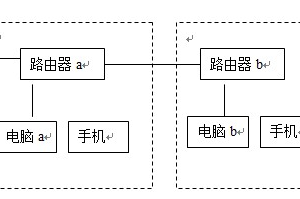
怎么把无线路由器设置成无线交换机 TP-LINK无线路由器作为无线交换机教程
-
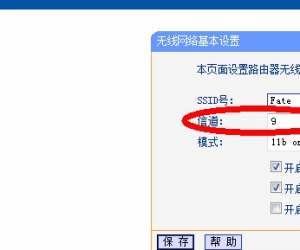
wifi无线路由没有信号怎么办 连接成功找不到无线路由器信号解决方法
-

如何利用WDS延伸wifi覆盖范围 路由器怎么开启WDS模式扩展WIFI范围
-
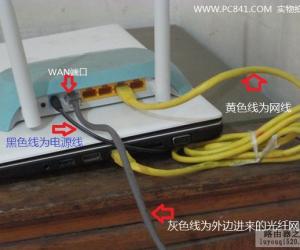
家用光纤路由器怎么设置步骤图解 光纤用户的路由器如何连接设置方法
-

无线路由器网络DNS被劫持了怎么办 如何查看路由器是否被劫持了方法
-
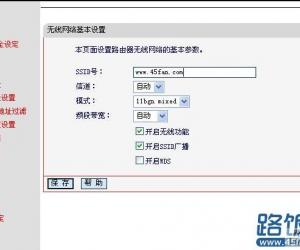
如何查看无线路由器有几个人用 怎么查询有多少人连接到我的路由器
-

使用宽带路由器设置过滤不良网站方法 如何利用路由器限制访问某些网站
-

路由器端口模块化和非模块化区别在哪 路由器分模块化和非模块化是什么意思
-
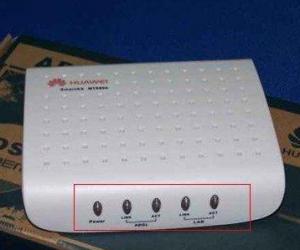
路由器和光猫ip地址冲突怎么办 路由器和光猫的区别是什么详细介绍
-

无线路由器固件损坏怎么修复方法 如何检测无线路由器是否损坏教程
软件推荐
更多 >-
1
 智能路由器哪个好 8款2015家用智能路由器推荐
智能路由器哪个好 8款2015家用智能路由器推荐2015-09-01
-
2
如何将WiFi信号隐藏防止别人用万能钥匙蹭网
-
3
路由器重置后怎么办 路由器重置后如何设置?
-
4
[WDS无线桥接功能] 教你如何扩展家中WIFI信号覆盖
-
5
192.168.1.1管理员密码是什么?
-
6
路由器怎么看宽带上网帐号和密码?查看路由器宽带密码方法图文介绍
-
7
极路由3怎么样?极路由3真机拆解评测
-
8
腾达A301怎么设置 腾达A301设置图文教程
-
9
水星路由器怎么设置无线网络密码?
-
10
腾达路由器怎么恢复出厂设置 Tenda路由器恢复出厂设置2种方法








